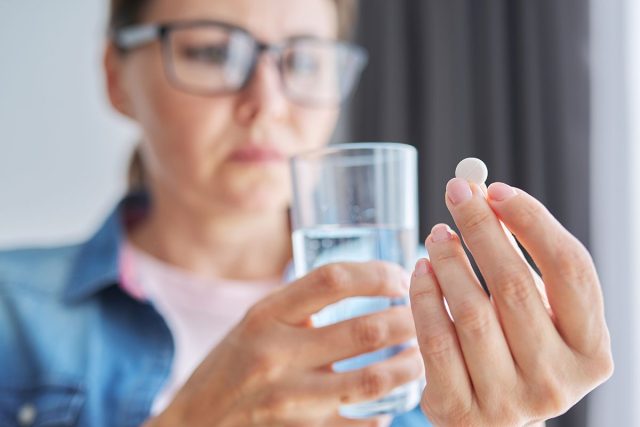Signs Your Prescription Drugs May Be Making You Sick, Including Headache

Consider this: Nearly half of all Americans used at least one prescription drug in the past month, according to the Centers for Disease Control and Prevention.
And nearly one in four used three or more prescription medications in the last month.
It then comes as no surprise that many people suffer ill effects from all those drugs. And we're not just talking about prescription drug abuse, which means using a medication in a manner or dosage other than that prescribed.
Prescription drug abuse is indeed a growing problem in this country. It usually involves people abusing opioids, depressants such as tranquilizers and sedatives, and stimulants such as those prescribed for attention-deficit hyperactivity disorder, according to the National Institute on Drug Abuse.
Even without abuse, people may get sick from taking their legally prescribed medications in the manner they were prescribed. Here's what you need to know to avoid falling ill because of your prescriptions.
How Medications Make You Sick

Medications may have toxic side effects, even when taken as prescribed. This happens as you get older and may result from unintended interactions among your various prescriptions.
Drug toxicity is "a major public-health issue even for people in their 40s and 50s," says Dr. Mukaila A. Raji, chief of geriatric medicine at the University of Texas Medical Branch in Galveston.
"Most drugs are eliminated from the body through the kidneys and liver, but starting around the fourth decade, we start accumulating fat and lose muscle mass, accompanied by a progressive decline in the ability of our kidneys and liver to process and clear medications," Raji adds. "All of this makes us more prone to drug toxicity."
"This is a particular issue in older individuals, because older people tend to have more medical conditions that we now have wonderful evidence basis of the benefits of medications to treat those conditions," adds Dr. Mark Supiano, executive director of the University of Utah Center on Aging.
"When we start to add up those conditions, however, if you start to have three, four, five chronic conditions, and you're on three or five medications for each of those conditions, that multiplier effect increases your risk of having an adverse medical event or a side effect from the interactions between those medications. So older people that we treat are more likely to be on more medications and are therefore at higher risk for exactly these kinds of problems."
It's Not Just Drugs

You may experience unintended side effects when your prescription medications interact with other things you're taking, such as dietary supplements, vitamins and over-the-counter drugs.
"Sedatives or hypnotics or sleep aids that you might be taking over the counter, all of those," Supiano says.
He adds: "So we are very aware of that and really need to be careful about the potential interactions between some of those supplements and prescription and other medications."
Signs There's a Problem

"Some medications such as antibiotics, cause nausea, but it is not serious, it is manageable," says Heidi N. Anksorus, a clinical assistant professor at the University of North Carolina's Eshelman School of Pharmacy in Chapel Hill. "And with some medications, the side effects will disappear, but you have to stick with it for a couple of weeks."
"Blood pressure medications may cause a cough that won't go away," Anksorus adds.
Anticoagulants such as warfarin (Coumadin) can cause bleeding, and opioids such as oxycodone, hydrocodone or fentanyl can cause drowsiness.
Don't ignore side effects such as blood in the urine or stool, shortness of breath, blurred vision or an intense headache.
With "many of these side effects, someone might think, 'Well, I'm just getting older, so of course I feel run down the next day or I'm having this particular symptom,' say constipation," Supiano says. "They may think this is just part of getting older and may not ascribe it to the medication."
But "anytime someone has a new symptom, we need to first ask, 'Is this potentially caused by an existing medication?'" Supiano adds. "What we really want to avoid is treating that new symptom with yet another medication, because that adds further to this list of medications. It becomes a vicious cycle, and you just keep adding on more and more medications, and you get more and more side effects, and the patient isn't getting any better."
How Do You Know Which Medications to Stop?

To avoid drug toxicity, you should keep a careful record of the drugs you're taking — including supplements and over-the-counter medications — and share it with any doctor you visit. You should also ask your doctor if a new prescription will interact with all the medications you're taking.
"Many doctors don't specifically test for drug toxicity, and a simple CBC [blood chemistry panel] won't detect it," Raji says. Some blood tests can detect the effects of drugs such as Synthroid, Coumadin, antibiotics and digoxin.
"The blood range of digoxin that's listed as 'normal' in medical textbooks is based on tests done on young people," Raji adds.
"As doctors, we see a lot of patients who come in with a general 'I don't feel well' complaint, or maybe they're confused and dehydrated, and we attribute it to a viral illness, when it's caused at least in part by the medication they're taking," says Dr. Kennon Heard, a medical toxicologist and associate professor at the University of Colorado School of Medicine in Denver.
What to Do About It

"Make a list of all the medications, vitamins, supplements and herbal remedies you are taking, and keep it up to date," Anksorus says. Be specific: "Telling your doctor that you 'take a little white blood pressure pill that starts with an 'A' won't help — there are a million little white pills that start with an A."
"If you're going to a single pharmacy, if they have an accurate record of all your prescription medications, there are systems now to screen for the most offensive drug-drug interactions," Supiano says. "Most physicians are likewise aware of that." But if you get your medications from several different pharmacies, the systems may not flag interactions; it then falls to you to ask your pharmacist about interactions each time you fill a new prescription.
"There are other subtleties that individuals trained in geriatrics are more likely to pick up," Supiano says. Your doctor or pharmacist may lack geriatrics expertise or awareness that aging changes how the body gets rid of medications that can increase your risk of having the side effects. Don't be shy about asking your doctor or pharmacist about it.
"So if you're not adjusting the dose of the medication appropriately for that person's age or their kidney function that there may be toxic levels of the medication that accumulate and cause these side effects," he adds.




